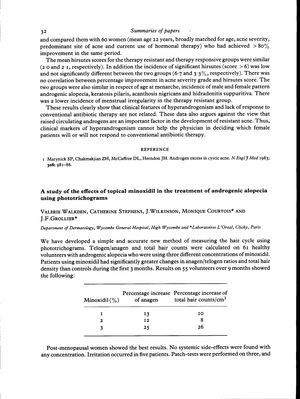A Study of the Effects of Topical Minoxidil in the Treatment of Androgenic Alopecia Using Phototrichograms
July 1989
in “
British Journal of Dermatology
”

TLDR Minoxidil helps increase hair growth and density in people with hair loss, with higher concentrations giving better results.
In a study conducted on 61 healthy volunteers with androgenic alopecia, researchers found that using three different concentrations of topical minoxidil resulted in significantly greater changes in anagen/telogen ratios and total hair density compared to controls over the first 3 months. Over a 9-month period, the study showed that a 1% minoxidil solution increased the percentage of anagen hairs by 13% and total hair counts by 10%, a 2% solution increased anagen hairs by 12% and total hair counts by 8%, and a 3% solution increased anagen hairs by 25% and total hair counts by 26%. Post-menopausal women experienced the best results. No systemic side effects were reported, although irritation occurred in five patients, with two confirmed to be allergic to minoxidil through patch tests. The study concluded that the phototrichogram method used was simple, reliable, and useful for measuring treatment response in patients with androgenic alopecia.




